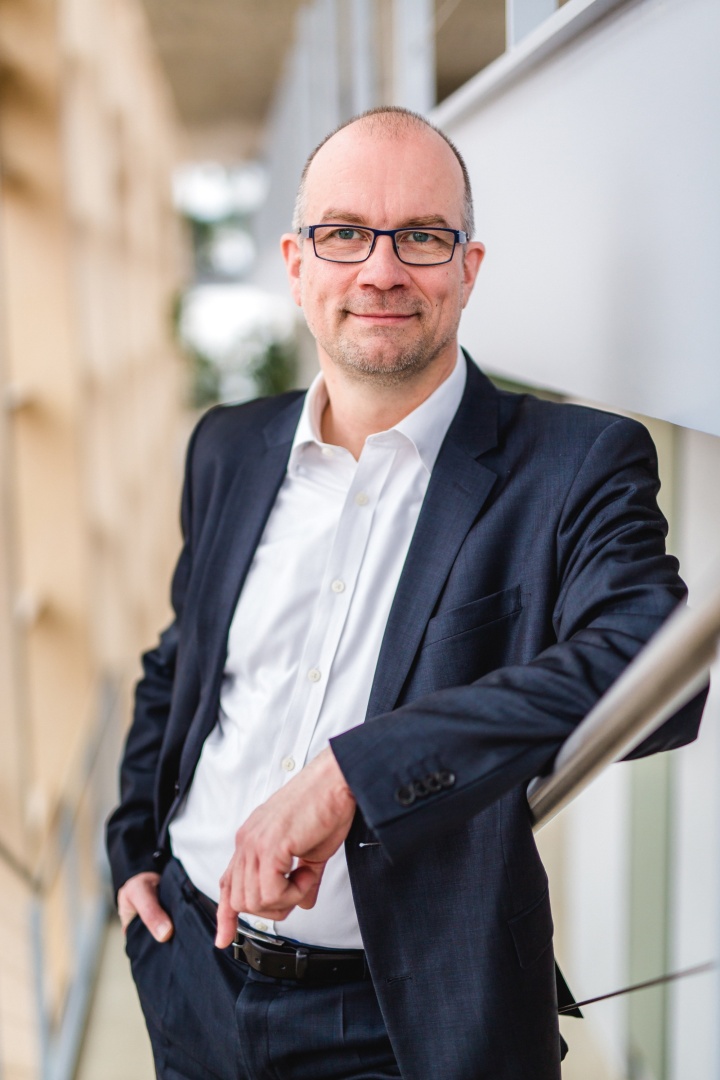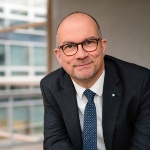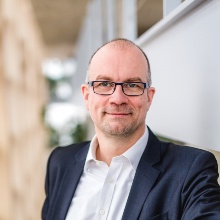Oliver Riedel has been a professor at the Institute for Control Engineering of Machine Tools and Manufacturing Units (Institut für Steuerungstechnik der Werkzeugmaschinen und Fertigungseinrichtungen / ISW) since 1st November 2016. The bright spark from north Germany is a generalist and specialist all rolled into one. His passion for hands-on research is infectious.
Utmost pleasure with new research approach
Professor Riedel is a man of practical experience with excellent connections, who has stepped up after 20 years in top management in order to impart the joy of mathematics to the students whilst providing a simultaneous reference to practice. The so-called “model based production engineering“ of his chair is interdisciplinary since it combines computer science with mechanical engineering.
He is full of praise for the students and the employees at the Institute. “There are super cool, intrinsically motivated people and super cool projects here“, said the 52-year old enthusiastically. In his next working years he wants to “really let rip once again at the point where research is just starting”.
Combination of IT in production and IT in product development
Somebody like him cannot be pigeonholed – even if he constantly thinks in categories and small pigeonholes as a system thinker with his heart and soul. In order to be able to recruit him in the long term for research and teaching, the university quickly dreamt up something: it founded the new chair “Information Technology in Production“ and was able to convince its preferred candidate to return again to Stuttgart as its professor and additional institute head of the ISW.
You immediately believe him when he says that he sees this position as the ending point and highlight of his career. “It is a unique opportunity to create something that has not yet existed in Germany up to now in this form and in the combination of topics, namely the combination of IT in production and IT in product development” he enthusiastically reported. The former is his work at the university, he will pursue the product development at the Fraunhofer Institute for Industrial Engineering (Fraunhofer Institut für Arbeitswirtschaft und Organisation / IAO).

Passionate game with mathematics
Professor Riedel is a repeat offender in terms of his work at the University of Stuttgart. In the middle of the 1980s he studied Technical Cybernetics here: “It is one of the very few branches of study in which you acquire an incredibly broad theoretical education in mathematics.“ This course of study enabled him to internalize a very clear system concept. Solving problems by means of models accompanied him throughout this entire career. He found technical cybernetics such fun that he initially “got stuck” at the university in order to even then intensify his knowledge at the time in both range of topics, thermodynamics and image recognition.
Working hard on the latest developments
The algorithms in image recognition initially led him to the automobile industry at the end of the 1980s. What many cars can do today thanks to driving assistance systems, for example recognizing traffic signs, was Professor Riedel’s theme.
He did his doctorate at the Institute for Labor and Technology Management (Institut für Arbeitswissenschaft und Technologiemanagement) at the university under the leadership at the time, Professor Hans-Jörg Bullinger, simultaneously the co-founder of the Fraunhofer IAO, who became his doctoral supervisor. Here Professor Riedel threw himself into the subject area of virtual reality. New at the time, today hard to imagine being without in science and industry and absolutely imperative. With a twinkle in his eye, Professor Riedel revealed that he “actually did his PhD on the side”. Which nevertheless led him to reaping a prize for his doctorate.
Yet with so much research under his belt it was the reputation of the industry that then enticed him away. Via a Swabian medium-sized enterprise the path then led to an American IT company, from which such famous companies as Nvidia emerged. Then he entered the automotive industry in 2003, followed by 14 years in Ingolstadt and Wolfsburg. Years in which he dedicated himself to the topics of simulation and virtual reality concerning everything to do with automobile development, including worldwide IT responsibility in engineering.
Back to Alma Mater
“One very fine day there came a call from today’s dean”, Professor Riedel laughs as he recalls the incident. “Do you actually know how old I am”, he replied. However, when his former doctoral supervisor Jörg Bullinger called, he sent off his application.
To combine both subject fields from the university and Fraunhofer Gesellschaft in such a way that you acquire the entire product development process in one hand, this for Professor Riedel is “an absolute dream, a unique opportunity you cannot miss.“ In so doing he is further exhilarated by the scientific environment at the faculty, at the university and at the Fraunhofer location in Stuttgart he describes at “absolutely top class”, as a “cool team that constantly endeavours with sparkling eyes to push research to the limits.“



